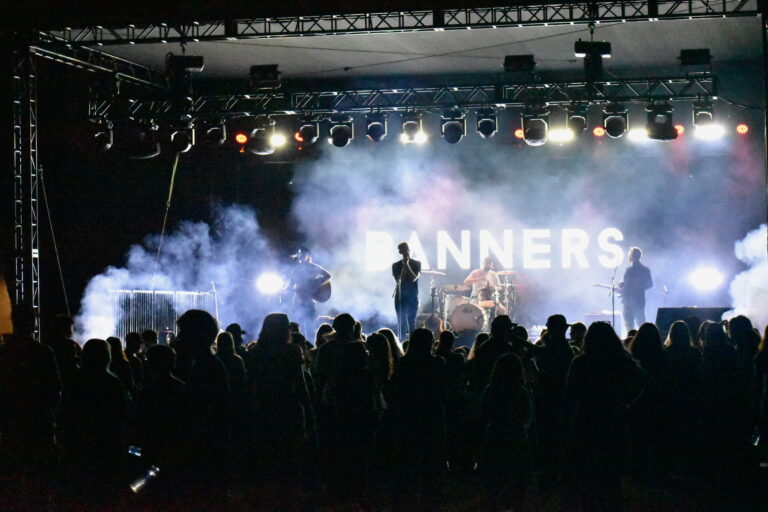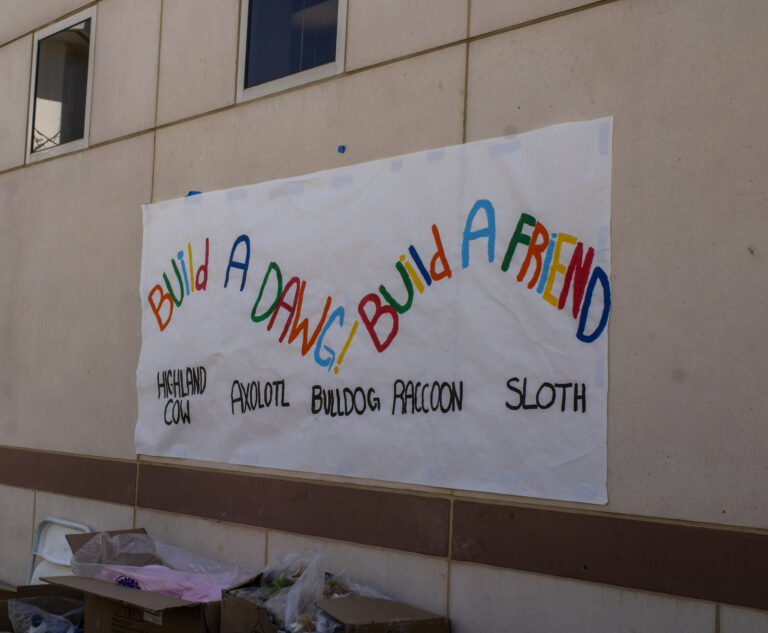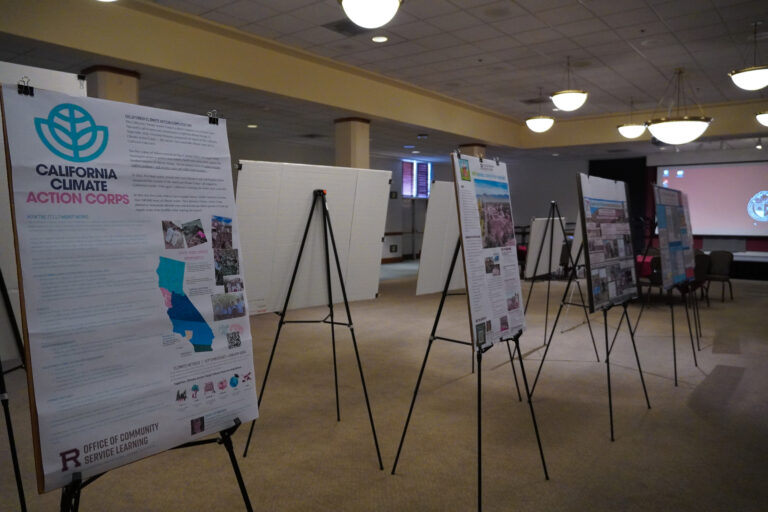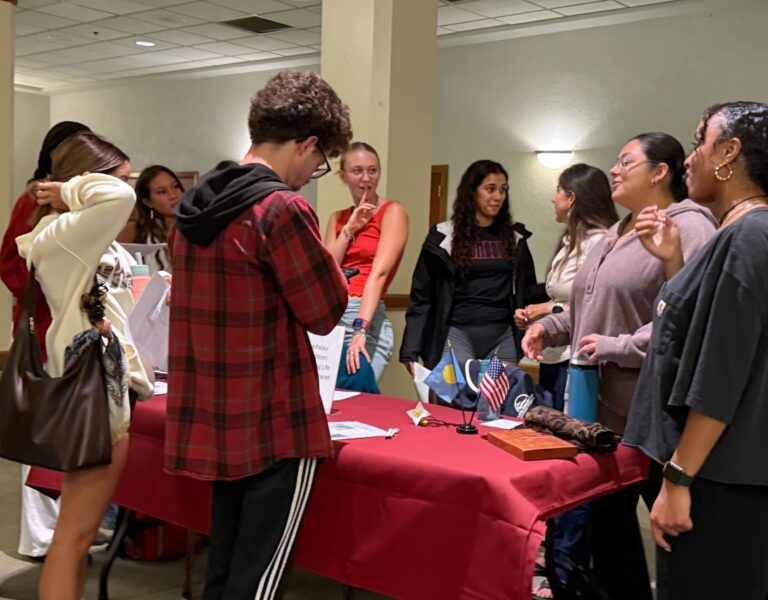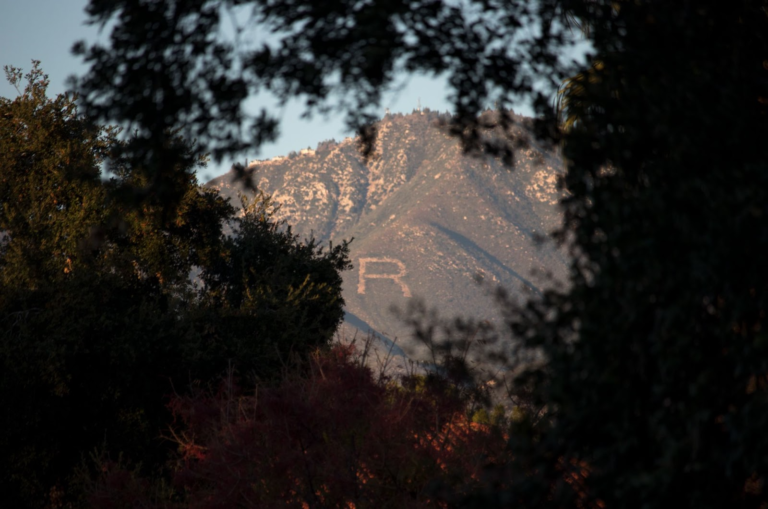
Bekins Lawn was a bright beacon of patriotism as the Johnston National Convention equipped students with everything they need to know for the election season.
This event, spanning between 1-6 p.m. on Friday, Oct. 11, was organized by Johnston Director Tim Sieber’s “Digital Media, Politics and Communication” class and focused on voter registration, education and general civic engagement.
Seiber teaches this course every four years in correspondence with the presidential elections. During the class, students design a project that contributes to the efforts of the Elections and Civic Engagement Group which coordinates campus-wide events throughout the year. In the past, Sieber’s classes organized a film screening and candidate forum.
Seven tables occupied Bekins Lawn. One actively registered students to vote while the others provided information on the voting process and specific ballot measures.
Those who visited all of the tables received a free item from the Daytime Java coffee shop and were entered into a gift card raffle. There was also a free lunch of burritos with all the fixings, chips and desserts – with gluten free and vegan options too.
Being a bipartisan convention, this event welcomed people from all political perspectives. Seiber said this was a point of emphasis, as he did not want people to feel threatened or singled out. For instance, indications of party preference, like candidate posters, were nonexistent.
“We’re just encouraging discourse rather than how to vote,” Seiber said.
There is a common belief that one vote carries little, if any, impact on an election. However, Seiber refuted this misconception and explained just how powerful the right to vote is.
“We are in a kind of generational shift in the electorate, in which more and more young people have felt disempowered by our political system. And so they choose not to vote, and therefore the interests and investments of older generations are over-represented.”
In providing pure, unbiased information, this convention also worked to increase voter confidence. Seiber explained how fake news, which is increasingly common in our day and age of widespread media, can drive people away from politics.
“Events like this encourage people to kind of see past those fears and to the appropriate and robust functioning of our democratic system,” he said.
At first glance, the voting process may appear complicated – especially for those who just turned 18. However, Sebier explained that it is quite the opposite. First of all, he said most states allow voters to register online and even provide the option of receiving ballot updates. Secondly, Seiber said there are a wide variety of voter guides that simplify ballot measures. For example, those interested in environmental issues can refer to voter guides from groups like the Sierra Club, a national environmental organization, to filter down the ballot measures to those of greatest interest. Major news publications, like the LA Times or Washington Post, are also helpful resources, Seiber said.

Lastly, Seiber pointed out that one does not need to vote on every ballot measure. Skipping over measures will not render the ballot invalid. That being said, one national ballot measure Seiber encouraged people not to leave blank is immigration because of the extensive impact it carries.
“Even if a topic in a national election seems to be really far away,” he said, “it actually might be really local and becoming informed helps you see that connection.”
On a more local scale, Seiber encouraged people to pay close attention to the topic of banned books. He also mentioned that Hillary Jenkins, who works in the Environmental Studies program here at the University of Redlands, is running for the local water board. Seiber said Jenkins not only proves that the university is connected with local issues, but also serves as an example of the civic engagement described at the JNC.
If anything, Seiber hoped this Johnston National Convention increased voter registration and conveyed the importance of being well-informed on political topics. He pointed out how modern technology tends to constantly feed people information they already agree with rather than being exposed to different perspectives.
“I want students to feel confident in having conversations with others, on or off-campus, without being in an echo chamber,” he said. “That’s what encouraging civic engagement is about.”
With the presidential election less than a month away, there is no better time to break free of the echo chamber and prepare to cast one’s vote.
Photos by McKenzie Rose
McKenzie Rose is a freshman at Redlands with interests in Environmental Studies and Journalism. She worked for the last three years as a freelance journalist with the Hermiston Herald, a newspaper near her hometown of Echo, Oregon. She is looking forward to covering the interesting, the exciting, and the intriguing happenings at the university for the Redlands Bulldog!




